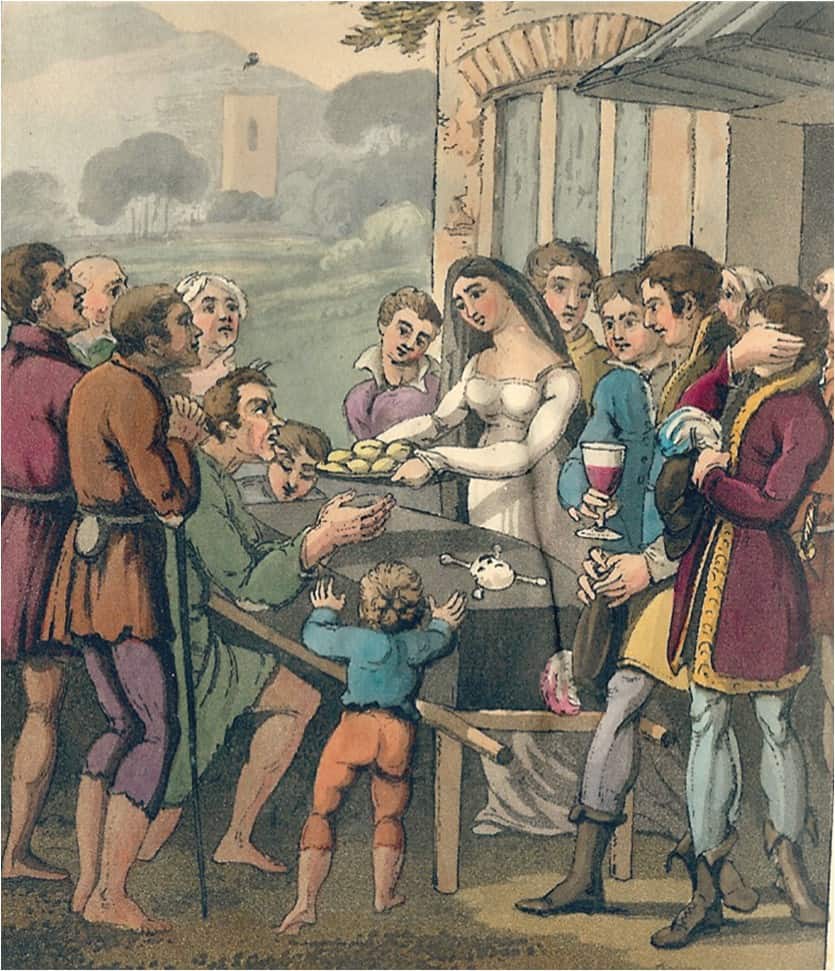 "Get rid of your sins, and leave all iniquity behind you". Well, some rituals are more morbid than others. A sin eater is a person who consumes a ritual meal in order to spiritually take on the sins of a deceased person. The ritual could be scaled up and down and sideways depending on status, wealth and sinfulness. Your sins would be absorbed and purgatory avoided. Sometimes the sin eater ate bread left on the corpse’s chest or face. Other times, they ate food that had merely been held over the dead body. The act itself was one of extreme humiliation and degradation. Only the most destitute of all people would ever take on such a role, people who may have already thought of themselves as condemned for eternity. The sin eaters were social outcasts, and belonged to the lowest of the low in society. In all cases, sin eaters were paid next to nothing for their troubles. And despite removing sins from dead people — and taking them on themselves — they were feared and detested. Sin eaters were the ultimate scapegoats, bringing upon themselves sins that they did not commit and the punishment for those sins, both in this world and the next one. The sin-eater continued to be possessed by evil. Sin eating wasn’t a practice that was advocated by the church, who themselves were selling indulgences. It's not exactly clear where or how the concept began. Most likely it's a fusion between pagan culture and Christianity. The ritual of sin eating started to spread as early as the 17th century. The ritual is most commonly associated with Scotland, Ireland, Wales, English counties bordering Wales, and Welsh culture. The last recorded sin eater was Richard Munslow who died in Ratlinghope (Shropshire, England) in 1906. The story of sin eating is fascinating. To this day, food remains an important part of mourning. Eventually the breads and cakes no longer represented the sins and evil spirits, but rather were provided as refreshment for the mourners at the reception after a funeral or memorial service.
"Get rid of your sins, and leave all iniquity behind you". Well, some rituals are more morbid than others. A sin eater is a person who consumes a ritual meal in order to spiritually take on the sins of a deceased person. The ritual could be scaled up and down and sideways depending on status, wealth and sinfulness. Your sins would be absorbed and purgatory avoided. Sometimes the sin eater ate bread left on the corpse’s chest or face. Other times, they ate food that had merely been held over the dead body. The act itself was one of extreme humiliation and degradation. Only the most destitute of all people would ever take on such a role, people who may have already thought of themselves as condemned for eternity. The sin eaters were social outcasts, and belonged to the lowest of the low in society. In all cases, sin eaters were paid next to nothing for their troubles. And despite removing sins from dead people — and taking them on themselves — they were feared and detested. Sin eaters were the ultimate scapegoats, bringing upon themselves sins that they did not commit and the punishment for those sins, both in this world and the next one. The sin-eater continued to be possessed by evil. Sin eating wasn’t a practice that was advocated by the church, who themselves were selling indulgences. It's not exactly clear where or how the concept began. Most likely it's a fusion between pagan culture and Christianity. The ritual of sin eating started to spread as early as the 17th century. The ritual is most commonly associated with Scotland, Ireland, Wales, English counties bordering Wales, and Welsh culture. The last recorded sin eater was Richard Munslow who died in Ratlinghope (Shropshire, England) in 1906. The story of sin eating is fascinating. To this day, food remains an important part of mourning. Eventually the breads and cakes no longer represented the sins and evil spirits, but rather were provided as refreshment for the mourners at the reception after a funeral or memorial service.
Featured
"Sin Eater"
Konztroll
Hits: 1222
